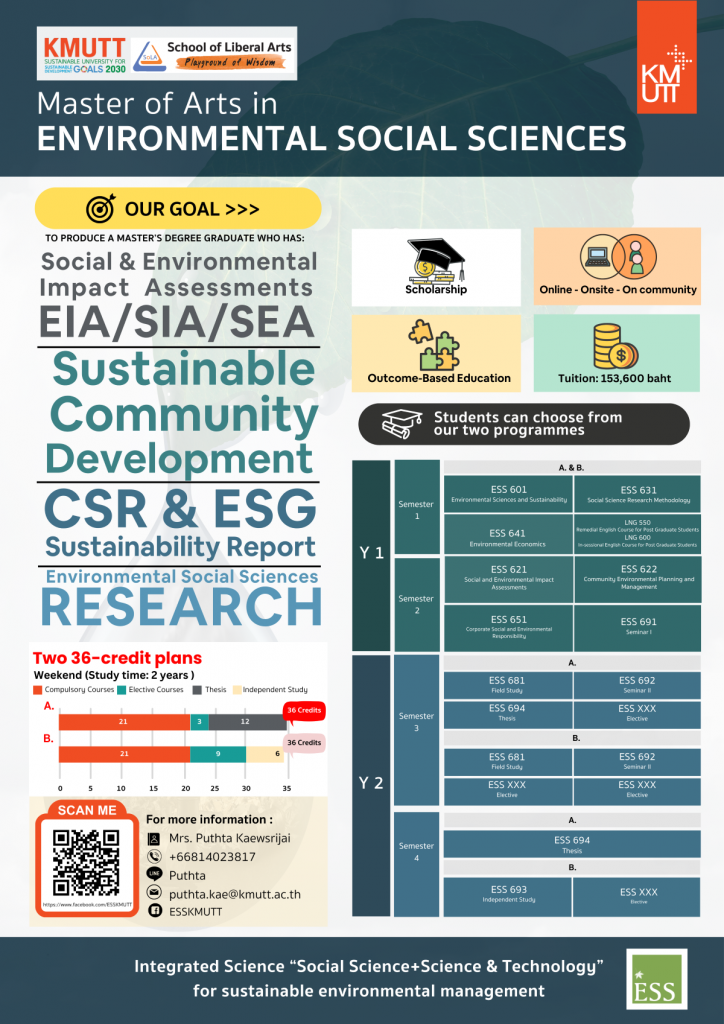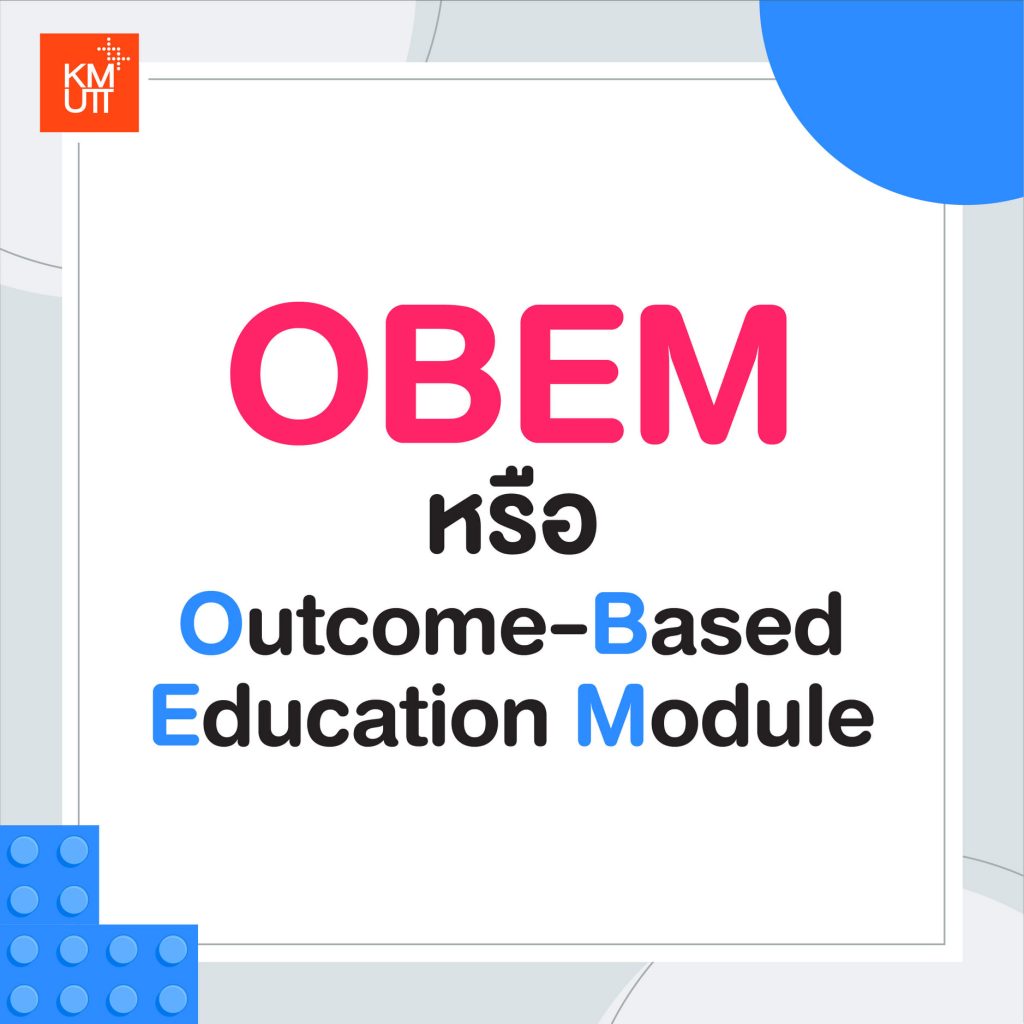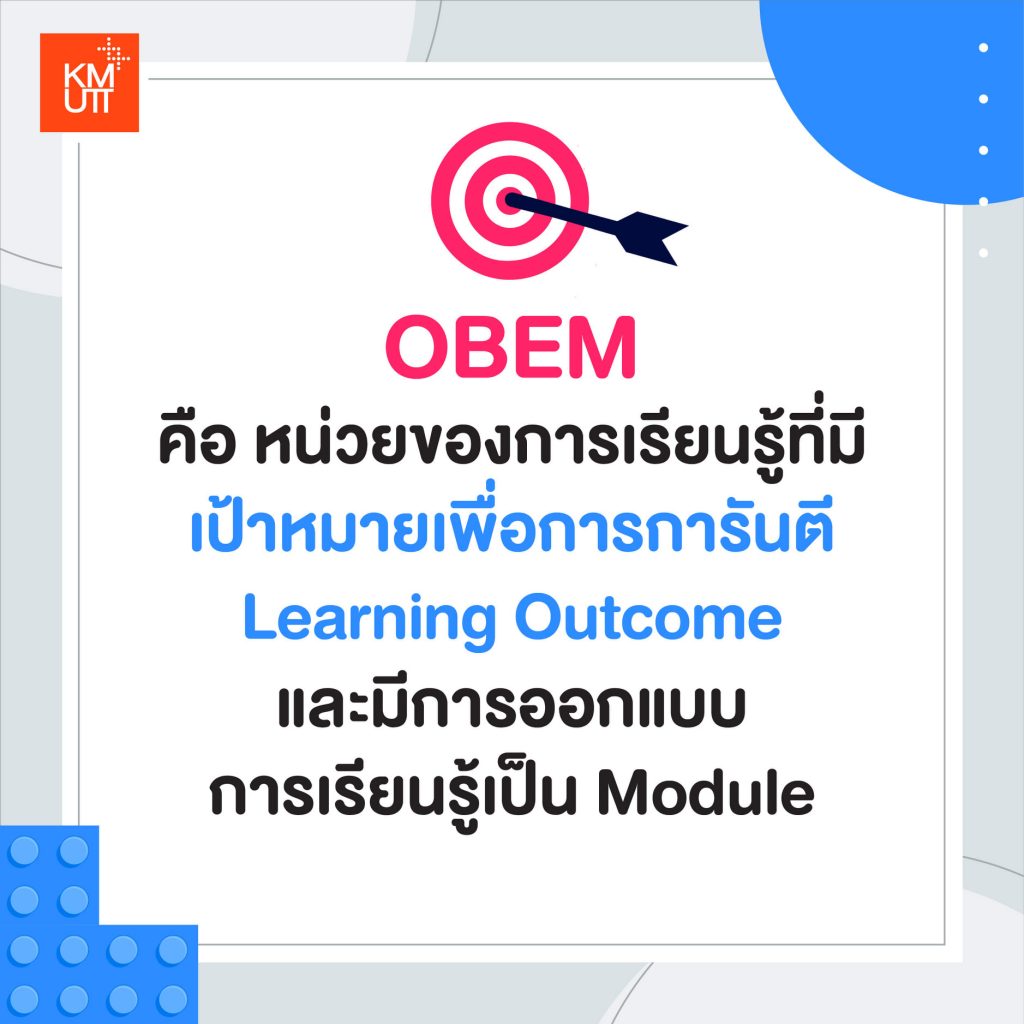
Degree
Master of Arts in Environmental Social Sciences (Thai Program)
Offered by
School of Liberal Arts
King Mongkut’s University of Technology Thonburi
Two 36-credit plans
- Plan A (Thesis 12 Credits) 36 Credits
- Plan B (Independent Study 6 Credits) 36 Credits
Careers that can be pursued after graduation
(1) Social and Environmental Impact Assessors EIA/SIA/SEA
Environment Officer, Plan and Policy Analyst, Environmental Scientist, Field Officer
(2) Sustainable Community Development
Social Development Worker, Assistant Social Development Officer
(3) CSER & ESG Sustainability Report
Sustainability Officer, Sustainable Develop Specialist, Sustainability or ESG Officers, CSR Office
(4) Environmental and Social Scientists Research
Lecturer, Researcher, Environmental and Social Scientists
Day-time for teaching and learning
Outside of the day – Business hours between Monday – Friday from 5:30 p.m. – 8:30 p.m.
and/or between Saturday – Sunday from 9:00 a.m. – 4:00 p.m.
However, the teaching date and time may be changed as appropriate.
Academic calendar
Semester 1 starts in August – December.
Semester 2 starts in January – May.
Translate by Google
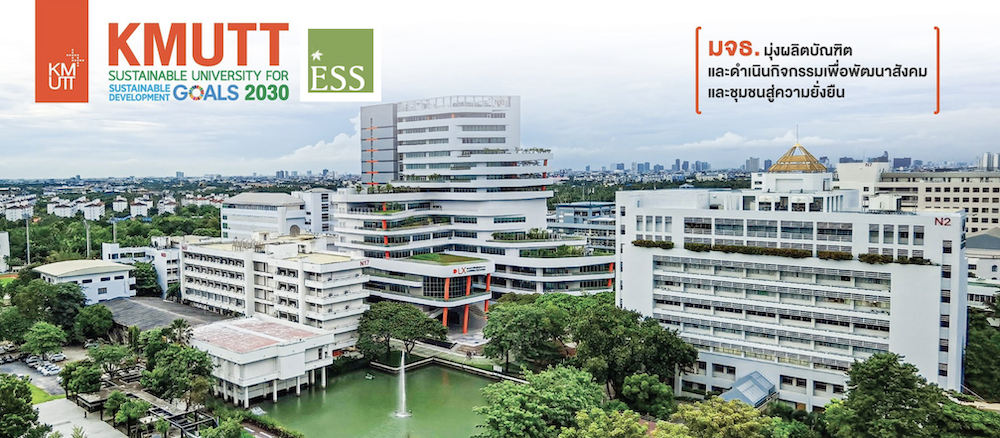
Philosophy, importance and objectives
Philosophy
Aiming to produce personnel with expertise in environmental social sciences. that can apply knowledge and skills in social sciences and field experience in environmental management and has a paradigm of sustainable development Including adhering to morality and ethics in occupation
Importance
Development of the country in the past, such as industrial development farming and tourism development It has caused widespread environmental problems at the local, national and global levels, such as pollution contamination in the environment of local communities. Pollution in urban communities increase in greenhouse gases Loss of fertile natural areas and the degradation of natural ecosystems Leading to health problems for people in areas with development projects. and affecting the quality of life of the people as a whole In addition, environmental problems at all levels also affect the capacity of future economic development. The important factor causing this problem to occur is the lack of careful project development planning. Lack of deep understanding of the impacts of development, especially the social dimension. Including a lack of awareness of sustainability in development.
Integrating social sciences into the planning and decision-making process for developing various economic activities plays an important role in solving environmental problems. It will help create a greater understanding of the value of natural resources and the environment in developing the quality of human life. The impact of development can be predicted effectively. A paradigm of sustainable development and greater social and environmental responsibility has emerged. including understanding the important role of social mechanisms in environmental management
Social Sciences and Humanities subjects Faculty of Liberal Arts which is an organization of King Mongkut’s University of Technology Thonburi has seen such a problem Therefore, there is an aim to develop human resources within the country to be knowledgeable. Ability and expertise in environmental social science to be used in solving environmental problems and developing a sustainable society. The curriculum has divided learning units into 4 main groups to promote students’ potential in 4 areas as follows: 1) Potential to predict social and environmental impacts from developing various projects. There are related subjects such as evaluation. Social and environmental impacts Strategic Environmental Assessment Sociology of risk and uncertainty, etc. 2) Potential to develop sustainability projects or social and environmental responsibility projects of various organizations. There are related subjects such as social and environmental responsibility. social enterprise Good governance in organizations, etc. 3) Potential in strategic planning for sustainable community development. Create a balance between society, the economy and the environment. There are related subjects such as community environmental planning and management, community master planning. local economic development, etc. and 4) potential to conduct research in environmental social sciences There are related subjects such as social science research methods. Statistics for social science research, etc.
Therefore, the Master of Arts program The field of Environmental Social Sciences is therefore a course that responds to the context of sustainable national development that places importance on social, economic, and environmental dimensions. It is also a course that creates change agents (Change Agents) who have both knowledge and skills in Work in various organizations such as community developers Social activities officer Expert in environmental impact analysis, human use value assessment and quality of life. which is considered a cog in the further development of the country
Objectives of the course
- To produce graduates in environmental social sciences who can use social science knowledge to analyze problems. Evaluate impacts and present guidelines for solving environmental problems.
- To produce graduates who can plan environmental strategies and sustainable community and organizational development plans.
- To produce graduates with the ability to conduct research in environmental social sciences.
Translate by Google
Program Learning Outcome: PLO
PLO 1: Able to establish guidelines for managing social, economic, and environmental impacts. arising from various development projects correctly according to academic principles
1.1 Able to analyze the social, economic, and environmental context in the development project area.
1.2 Able to apply concepts Social science theories To analyze social impacts
Economy and environment arising from development projects
1.3 Able to evaluate approaches, measures, or alternatives to reduce social, economic, and
Environment caused by development projects By adhering to moral principles and have professional ethics
PLO 2: Can set policy and plans for sustainable management of resources and the environment at the community level.
2.1 Able to apply tools, mechanisms, and social measures to manage community resources and environment.
2.2 Able to design policies and prepare community-level resource and environmental management plans.
PLO 3: Able to plan corporate social and environmental responsibility strategies in line with community and social needs
3.1 Able to analyze community needs Society to create projects on social and environmental responsibility.
3.2 Able to create a community participation process in social responsibility projects and
environment
3.3 Able to design projects, activities, and create strategic plans for social responsibility and
The environment is in line with the needs of the community and society.
PLO 4: Be able to conduct research related to environmental issues using social science research methods.
4.1 Able to design research processes and conduct research that is consistent with environmental social science issues correctly according to academic principles.
4.2 Able to prepare study reports or environmental research reports that are correct according to academic principles.
4.3 Able to present guidelines for managing or solving environmental problems.
PLO 5 : Able to communicate and work with others who are socially, economically, and culturally diverse.
5.1 Able to communicate and present information to stakeholders and the public under
Social, economic and cultural diversity
5.2 Able to adapt to a work environment that is socially, economically, and culturally diverse.
Translate by Google
Course structure
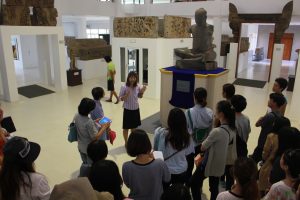
| Study plan | Subject category | Number of credits |
| Plan A (Thesis 12 credits) | A. Compulsory subjects | 21 |
| B. Elective course category | 3 | |
| C.Thesis | 12 | |
| together | 36 credits | |
| Plan B (Independent Study 6 credits) | A. Compulsory subjects | 21 |
| B. Elective course category | 9 | |
| C.Thesis | 6 | |
| together | 36 credits |
Course credits
( lecture-practice-self study)
| Subject category | Course | Number of credits |
| English subject category (credits not counted) | LNG 550 Remedial English Course for Post Graduate Students | 2 (1-2-6) (S/U) |
| LNG 600 English during the course of study for graduate students. (In-sessional English Course for Post Graduate Students) | 3 (2-2-9) (S/U) |
Note : Students must take LNG 550 and/or LNG 600 and/or have received Exceptions depend on the test score level and conditions as determined by the Faculty of Liberal Arts.
A. Required subjects (21 credits )
| Subject category | course | Number of credits |
| A. Required subjects (21 credits ) | ESS 601 Environmental Sciences and Sustainability | 3(3-0-9 |
| ESS 621 Social and Environmental Impact Assessments | 3(3-0-9) | |
| ESS 622 Community Environmental Planning and Management | 3(3-0-9) | |
| ESS 631 Social Science Research Methodology | 3(3-0-9) | |
| ESS 641 Environmental Economics | 3(3-0-9) | |
| ESS 651 Corporate Social and Environmental Responsibility | 3(3-0-9) | |
| ESS 681 Field Study | 1(0-2-3) | |
| ESS 691 Seminar 1 (Seminar I) | 1(0-2-3) | |
| ESS 692 Seminar 2 (Seminar II) | 1(0-2-3) |
- Elective subjects are divided into 4 subject groups, 3/9 credits.
- For Plan A 2 students, students must choose 1 elective subject from the elective subjects in Group B.1- B.4.
- For Plan B students, students must choose to complete 3 elective subjects from the elective subjects in groups B.1-B.4 (groups can be repeated).
| Subject category | course | Number of credits |
| Elective courses (3/9 credits) | ||
| B.1 Social and environmental impact management subject group | ||
| ESS 623 Sociology of Risk and Uncertainty | 3(3-0-9) | |
| ESS 624 Community Health Impact Assessment | 3(3-0-9) | |
| ESS 625 Environmental Risk Communication (Environmental Risk Communication) | 3(3-0-9) | |
| ESS 653 Strategic Environmental Assessment | 3(3-0-9) | |
| B.2 Social and Environmental Responsibility Subject Group | ||
| ESS 654 Corporate Sustainability Management | 3(3-0-9) | |
| ESS 655 Social Enterprise | 3(3-0-9) | |
| ESS 656 Corporate Governance | 3(3-0-9) | |
| ESS 657 Global Sustainability Issues and Corporate Responsibility | 3(3-0-9) | |
| B.3 Sustainable Community Development subject group | ||
| ESS 626 Political Ecology | 3(3-0-9) | |
| ESS 627 Community Master Plan | 3(3-0-9) | |
| ESS 628 Environmental Sociology | 3(3-0-9) | |
| ESS 629 Participatory Process Development | 3(3-0-9) | |
| ESS 642 Local Economic Development | 3(3-0-9) | |
| B.4 Other subject groups | ||
| ESS 632 Statistics for Social Science Research | 3(3-0-9) | |
| ESS 643 Energy Economics and Policy | 3(3-0-9) | |
| ESS 652 Innovative Management of Conflict | 3(3-0-9) | |
| ESS 671 Environmental Psychology | 3(3-0-9) | |
| ESS 695 Special Topic 1 (Special Topic I) | 3(3-0-9) | |
| ESS 696 Special Topic 1 (Special Topic II) | 3(3-0-9) |
- Thesis/Independent research 6 / 12 credits
- Subject Category Course Number of Credits C. Thesis / Independent Study ESS 693 Independent Study (Independent Study) 6 credits (6/12 credits ) ESS 694 Thesis (Thesis) 12 credits
Translate by Google
Study Plans
Plan A 2 (Thesis 12 credits)
| Year/Semester | course | Number of credits |
| Year 1, Semester 1 | ESS 601 Environmental Sciences and Sustainability | 3(3-0-9) |
| ESS 631 Social Science Research Methodology | 3(3-0-9) | |
| ESS 641 Environmental Economics | 3(3-0-9) | |
| Total 9(9-0-27) | Hours /week = 36 | |
| Year 1, Semester 2 | ESS 621 Social and Environmental Impact Assessments | 3(3-0-9) |
| ESS 622 Community Environmental Planning and Management Environmental Planning and Management) | 3(3-0-9) | |
| ESS 651 Corporate Social and Environmental Responsibility | 3(3-0-9) | |
| ESS 691 Seminar 1 (Seminar I) | 1(0-2-3) | |
| Total 10(9-2-30) | Hours /week = 41 | |
| Year 2, Semester 1 | ESS 681 Field Study | 1(0-2-3) |
| ESS 691 Seminar 2 (Seminar II) | 1(0-2-3) | |
| XXXXXX elective subjects (Elective) | 3(3-0-9) | |
| ESS 694 Thesis (Thesis) | 3(0-6-12) | |
| Total 8(3-10-27) | Hours/week = 40 | |
| Year 2, Semester 2 | ESS 694 Thesis (Thesis) | 9(0-18-36) |
| Total 9(0-18-36) | Hours/week = 54 |
Plan B (Independent Study 6 credits)
| Year/Semester | course | Number of credits |
| Year 1, Semester 1 | ESS 601 Environmental Sciences and Sustainability | 3(3-0-9) |
| ESS 631 Social Science Research Methodology | 3(3-0-9) | |
| ESS 641 Environmental Economics | 3(3-0-9) | |
| Total 9(9-0-27) | Hours /week = 36 | |
| Year 1, Semester 2 | ESS 621 Social and Environmental Impact Assessments | 3(3-0-9) |
| ESS 622 Community Environmental Planning and Management Environmental Planning and Management) | 3(3-0-9) | |
| ESS 651 Corporate Social and Environmental Responsibility | 3(3-0-9) | |
| ESS 691 Seminar 1 (Seminar I) | 1(0-2-3) | |
| Total 10(9-2-30) | Hours /week = 41 | |
| Year 2, Semester 1 | ESS 681 Field Study | 1(0-2-3) |
| ESS 691 Seminar 2 (Seminar II) | 1(0-2-3) | |
| XXXXXX elective subjects (Elective) | 3(3-0-9) | |
| XXXXXX elective subjects (Elective) | 3(3-0-9) | |
| Total 8(6-4-24) | Hours/week = 34 | |
| Year 2, Semester 2 | XXXXXX elective subjects (Elective) | 3(3-0-9) |
| ESS 693 Independent Study | 6(0-12-24) | |
| Total 9(3-12-33) | Hours/week = 48 |
Translate by Google
Course description
Translate by Google
Teaching Staff
| Name | Major | Research area |
| Asst. Prof. Dr. Sasitorn Suwannathep | การบริหารการพัฒนา (2546, สถาบันบัณฑิตพัฒนบริหารศาสตร์, ประเทศไทย) | เศรษฐกิจชุมชน, การกำหนดนโยบายสาธารณะ, การวิจัยทางการด้านการเรียนการสอน, การศึกษาทั่วไป |
| Asst. Prof. Dr. Passanan Assavarak | สิ่งแวดล้อม การพัฒนาและความยั่งยืน (2556, Chulalongkorn University, Thailand) | สังคมวิทยา สิ่งแวดล้อมและการพัฒนา |
| Assoc. Prof. Dr. Surapong Chudech | การวิจัยพฤติกรรมศาสตร์ประยุกต์ (2542, มหาวิทยาลัยศรีนครินทรวิโรฒประสานมิตร, ประเทศไทย) | การวิจัยพฤติกรรมศาสตร์ประยุกต์ |
| Dr. Kongkarn Vachirapanang | Technology Management and Innopreneurship Program (2013, Chulalongkorn University, Thailand) | องค์กรแห่งการเรียนรู้และการจัดการความรู้,การจัดการเทคโนโลยีและนวัตกรรมสำหรับผู้ประกอบการทางสังคม, การพัฒนาภาวะผู้นำ |
| Dr. Parpamon Seeprasert | Environmental Engineering (2015, Kyoto University, Japan) | – Occupational health and safety – Environmental, Social, Health Impact Assessment – Corporate Sustainability Management and Risk Management |
| Dr. Ittisak Jirapornvaree | การจัดการสิ่งแวดล้อม (2564, สถาบันบัณฑิตพัฒน บริหารศาสตร์, ประเทศไทย) | การประเมินผลประทบ การประเมินวัฏจักรชีวิตผลิตภัณฑ์ การจัดการกากของเสีย |
อาจารย์
| ชื่อ | คุณวุฒิการศึกษา | สาขาวิจัย |
| ดร.สุรัตน์ เพชรนิล | การศึกษาตลอดชีวิตและการพัฒนามนุษย์ (2560, มหาวิทยาลัยศิลปากร, ประเทศไทย) | จริยศาสตร์สิ่งแวดล้อม,การออกแบบพัฒนากิจกรรมการเรียนรู้ตลอดชีวิต,กิจกรรมการเรียนรู้ของผู้ใหญ่,ความรับผิดต่อสังคม |
| ดร.เกศกัญญา ทัศสุวรรณ | วิศวกรรมศาสตร์และเทคโนโลยี (2565, สถาบันเทคโนโลยีนานาชาติสิรินธร มหาวิทยาลัยธรรมศาสตร์, ประเทศไทย) | ไมโครพลาสติก ระบบบำบัดน้ำเสีย ระบบนิเวศป่าไม้ |
| อาจารย์อณิษฐา จูฑะรสก | Technology and Innovation Management (2550, University of Sussex, UK) | STI Policy and Public Policy Technology and Innovation Management Impact Analysis and Economic Assessment |
อาจารย์พิเศษ
| Name | Major | Research area |
| อาจารย์สนธิ คชวัฒน์ | สภาวะแวดล้อม (2530, จุฬาลงกรณ์มหาวิทยาลัย, ประเทศไทย) | การประเมินผลกระทบสิ่งแวดล้อมและสุขภาพ/การควบคุมมลพิษ ขยะ น้ำเสีย อากาศ /การมีส่วนร่วมของประชาชน/การจัดการสิ่งแวดล้อมอุตสาหกรรม |
| รศ.ดร.ปิยะพงษ์ จันทร์ใหม่มูล | Environmental Systems Engineering (2014, Kochi University of Technology, Japan) | การวางแผนและการจัดการสิ่งแวดล้อมเมือง,นโยบายสิ่งแวดล้อมและกระบวนการจัดการ,การจัดการภัยพิบัติและการสื่อสารความเสี่ยง,กระบวนการตัดสินใจด้านสิ่งแวดล้อม,การวางแผนภาคและเมือง |
Program committee
- Dr. Parpamon Seeprasert
- Asst. Prof. Dr. Sasitorn Suwannathep
- Asst. Prof. Dr. Passanan Assavarak
- Assoc. Prof. Dr. Surapong Chudech
- Dr. Kongkarn Vachirapanang
- Dr. Surat Petchnil
- Dr. Ittisak Jirapornvaree
- Program director
- Committee member
- Committee member
- Committee member
- Committee member
- Committee member
- Committee member
- Committee member
- Committee member
- Committee member
Tuition fees
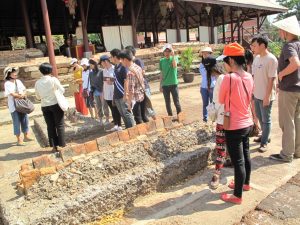
| Tuition rates | Semester | year |
| 1. Educational fees | 15,000.00 | 30,000.00 |
| 2. Registration fee (2,600 baht/credit) | 23,400.00 | 46,800.00 |
| Expenses throughout the course | 153,600.00 baht/person |
Average cost : Semester 38,400 baht (in the case of registering for 9 credits)
** The amount of this expense Other expenses such as accident insurance cards are not included. Health insurance card**
M.A. in Environmental Social Science: Scholarship
scholarship
- Petchra Pra Jom Scholarship for Academic Excellence and Petchra Pra Jom Scholarship to support Master’s level research groups. Click.
- One merit scholarship, consisting of credits and tuition fees, living expenses of 5,000 baht per month for 4 semesters.
- Approximately 10 teaching assistant scholarships, 3,000 baht each.
- Research assistant scholarships: approximately 2-3 scholarships, 5,000 baht each.
- Funds to support the publication of academic works
Learner qualifications
- Be a graduate of a bachelor’s degree in social sciences and humanities. Field of study: Engineering or Science with a cumulative grade point average of not less than 2.50 or
- Be a graduate of a bachelor’s degree in social sciences and humanities. Engineering or Science major and have experience in working related to the environment and sustainable development for not less than 2 years after graduating with a bachelor’s degree with a certificate from the supervisor or department head or other qualifications at the discretion of the curriculum management committee and according to the announcement of university criteria
Apply to study
Graduate student admissions Faculty of Liberal Arts Master of Arts Program Department of Environmental Social Sciences, Special Projects (Special Semester, Saturday-Sunday)
Amount received
12 students per academic year
Application schedule: Click
- Apply for applications from today – 23 June 2024.
- Start studying in semester 1/2024 (August 2024)
Follow news about the course on the course’s Facebook at:
Facebook : MA in Environmental Social Sciences, KMUTT.
Forms (Thai Version only)
Download form:
1.Thesis/research project proposal form
2.PROPOSAL REPORT
3. Form for nominating thesis examination committee members
4. Form B.3_6 credits
5. Form B.3_12 credits
6. Copyright transfer form
Thesis Templates ESS
1. Thesis Writing Manual
2. Reference
3. Thesis ESS
4. Thesis Format ESS
5. IS Format ESS
M.A. in Environmental Social Science: Contact Information
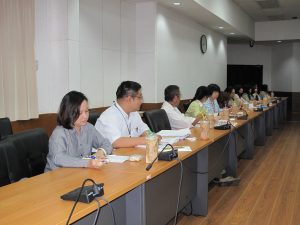
Contact us
Asst. Prof. Dr. Pasanan Asawarak (Teacher responsible for the curriculum)
Tel: 02-470-8707 Fax: 02-428-3375
E-mail: passanan.ass@kmutt.ac.th , passanan99@yahoo.com
Ms. Phuttha Kaewsrijai (Educational Service Officer)
Tel: 02-470-8770 Fax: 02-428-3375
E-mail: puthta.kae@kmutt.ac.th
Mobile: 081-4023817
Line ID : Puthta

